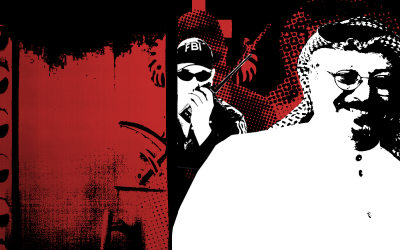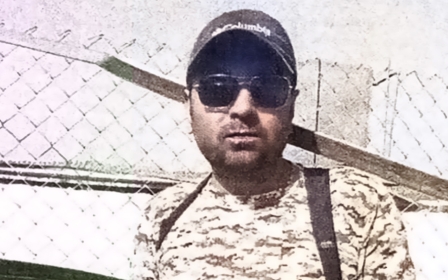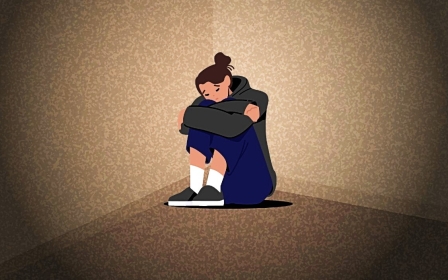Saudi women recall attempts by state-linked harasser to lure them on Instagram

Two Saudi Arabian women living in the United States have described how an anonymous Instagram user attempted to gain their trust, a week after the Saudi Arabian man who prosecutors say ran the account was arrested in Virginia.
One of the women said the account @samar16490 offered to give her documents that would help her in a multi-million dollar lawsuit a fellow Saudi Arabian citizen has brought against her - but only if they met in person.
A second woman said the same account sent her a photo of her grandfather in an effort, she believes, to coax her into disclosing where she was living.
Both women told MEE that, given the demonstrated reach of the Saudi government abroad in recent years, they already felt unsafe in the US
Their stories provide new and chilling details about an alleged campaign of harassment that was broadly outlined in a complaint unsealed last week in a New York federal court.
In that complaint, prosecutors say Ibrahim Alhussayen, 42, who was studying at a Mississippi university on a scholarship funded by the Saudi Royal Court and Saudi Cultural Mission, used the @samar16490 Instagram account to harass Saudi Arabian citizens in the US and Canada who were known critics of their government. Most of the alleged victims are women.
New MEE newsletter: Jerusalem Dispatch
Sign up to get the latest insights and analysis on Israel-Palestine, alongside Turkey Unpacked and other MEE newsletters
Alhussayen told FBI agents in an interview last year that he worked as an administrative adviser and consultant for the Saudi Royal Court, which is listed as his employer on his student visa, until 2012, but that he was no longer working for the Saudi government at that time.
During several months of the alleged harassment, the complaint said, he was in regular contact with an employee of the Saudi General Sports Authority, headed by Turki al-Sheikh, a close adviser to Crown Prince Mohammed bin Salman.
The latest episode
Asked for comment on the allegations laid out in the complaint as well as the new ones in this article, Alhussayen's Virginia-based lawyer, Thomas Walsh, responded in an email:
"You would hope - instead of the FBI creating crimes i.e. false statements charges [sic] and wasting money on a non-citizen who allegedly commented on social media in opposition to others and was moving back to his country, the FBI would concentrate on our government, such as the issues of the January 6, 2021 insurrection and the statements posted all over social media both pro and con."
"So he is being held in jail, with no criminal record, on charges that would amount to a sentence most likely of probation if found guilty - putting aside his First Amendment - free speech," Walsh wrote.
MEE sought a comment from the Saudi foreign ministry, but didn't receive a response by the time of publication.
'I was telling the NYPD, I don't care if I die. We're all going to die. I would like to die for a cause'
- Danah al-Mayouf, critic of Saudi government
This is the latest episode of alleged Saudi repression of dissidents abroad, which has flourished under Mohammed bin Salman and been empowered by an army of trolls on social media and military-grade spyware.
The US intelligence community has assessed that Saudi journalist Jamal Khashoggi, who had been a target of online abuse and whose close contacts were surveilled with spyware, was murdered in the kingdom's Istanbul consulate in 2018 by Saudi agents, in an operation approved by the crown prince.
In 2019, the Justice Department charged two former Twitter employees with spying after they allegedly obtained the details of 6,000 users and shared them with Saudi officials in exchange for money.
According to the complaint, US border enforcement officials found images of Khashoggi as well as screenshots of two of the slain journalist's tweets on Alhussayen's mobile phone during an inspection at Dulles International Airport this January.
The complaint underlines the US intelligence community's assessment of the Saudi government's role in Khashoggi's capture and killing by Saudi agents "as part of a series of 'dissident suppression operations' within the kingdom and abroad".
MEE asked the FBI whether it believed or had any evidence that Alhussayen was part of such an operation that might have involved offline harm to the individuals targeted. An FBI spokesperson told MEE: "The FBI has no comment."
Both women told MEE that, given the demonstrated reach of the Saudi government abroad in recent years, they already felt unsafe in the US. One has a panic button installed by local police; the other moved states three times after receiving death threats. But the complaint, they say, has been another reminder of their vulnerability for speaking out.
'You choose the place'
Danah al-Mayouf, who hosts a YouTube show that frequently criticises Saudi officials, including Turki al-Sheikh, says she is one of the victims outlined in the unsealed complaint.
In 2016, Mayouf sought asylum in the US, where she had been studying, fearing that if she returned home she would be prosecuted because of her political views, which she had expressed online.
"Part of what I do online is talk and expose public officials. We don't have media that reports on what's going on, what's going wrong with the government or criticising the government. So I think since I'm here, I should use my platform," she told MEE.
There have been offline ramifications for speaking out. Twice, she said, Saudi trolls have revealed her address online. And in August 2019, Model Roz - a Saudi influencer and model whose real name is Rawan Abdullah Abuzaid - sued Mayouf for $5m.
Abuzaid alleges that Mayouf maliciously defamed her and caused her to lose lucrative modelling gigs; Mayouf contends that she is exposing hypocrisy and has concerns that the Saudi government is behind the lawsuit, which is ongoing.
In December 2019, Mayouf said, she received a series of messages from @samar16490. The account offered her documents to help her in the lawsuit, but only if she would meet in person.
"If you want the documents, I'll be in New York City by the end of December," @samar16490 wrote in messages seen by MEE. "You choose the place you want so I can meet you and you can see the documents."
Mayouf told MEE: "I didn't feel safe. I felt like it was a trap."
After a back-and-forth discussion over several weeks in which Mayouf unsuccessfully tried to push @samar16490 to give her more details virtually, she blocked him.
She believes that Alhussayen was following orders from the Saudi government. "Honestly, I don't think anyone would want to waste their time luring me and trying to make up this story unless someone is telling them to do it," she said.
MEE asked the Saudi foreign ministry whether Turki al-Sheikh or any Saudi official had given Alhussayen orders to harass Saudi dissidents, but did not receive a response.
Mayouf said the New York City Police Department installed a panic button in her apartment in January, but said it didn't elaborate on why it was doing so.
She said she feels vulnerable even going out to the grocery store, but has continued to produce her show.
"I was telling the NYPD, I don't care if I die. We're all going to die. I would like to die for a cause," she said. "What they're doing is insane, and it should be a crime, and they should be held accountable for it."
'I don't feel safe at all'
Moudi Aljohani, a Saudi Arabian women's rights activist living in the US, said she also received messages from the account listed in the complaint and believes Alhussayen was trying to discover where she lived.
Aljohani fled Saudi Arabia in October 2016. She had been attending college in the US, but when she returned home for a visit in February 2016, her family confronted her for being "too Americanised," she said.
They cancelled her scholarship, seized her passport and locked her in the family home.
'I think he was trying to find out where I was'
- Moudi Aljohani, women's rights activist
From her room, she started speaking out anonymously against the kingdom's repressive guardianship laws, which give men control and authority over some of the most basic aspects of women's lives, from birth to death.
After eight months in confinement, she was able to take her passport and left for the US, where she sought asylum and continued speaking out, attracting frequent online abuse.
When she received messages from the @samar16490 Instagram account, Aljohani said she didn't give it too much attention because it came in the midst of an online smear campaign against her.
"I received lots of threats from other accounts," she said of that time.
However, she did think @samar16490 could be one of her family members trying to lure her because she has a relative named Samar and the account sent her a picture of her grandfather.
The messages, she added, came at a time when she was receiving lots of messages of "love, hate, shame and guilt" from relatives.
It was only when she saw the news of the unsealed complaint last week that she realised she had been duped. "I think he was trying to find out where I was," Aljohani told MEE. "I don't feel safe at all."
Protecting Saudi Arabians in the US
This isn't the first time in recent years that the FBI has used its resources to protect Saudi Arabians in the US.
In the weeks following Khashoggi's October 2018 murder, agents warned Saudi Arabian dissidents and others connected to the slain Middle East Eye and Washington Post columnist that there was a potential threat to their lives from the kingdom.
In 2020, Abdulrahman al-Mutairi, a young Saudi Arabian living in California who had spoken out against the crown prince on his YouTube show, told journalists that the FBI had thwarted an attempt by the Saudi government to kidnap him on US soil.
Meanwhile, UN figures show that the number of Saudi Arabians seeking asylum in the US each year since 2015, the year King Salman came to power, has continued to rise every year, with the exception of 2020 and 2021 during the Covid pandemic.
Yet experts recently told MEE that in the US, which is said to have one of the worst approval rates for Saudi asylum cases, asylum particularly for Saudi Arabian women and girls is becoming harder. Headline-grabbing reforms like the lifting of the ban on Saudi Arabian women driving have given the impression, they say, that it is safe for women in the kingdom despite the fact that repressive guardianship rules remain in place.
The situation leaves Saudi Arabian female asylum seekers in the US who want to speak freely about their country vulnerable on multiple fronts, facing online abuse from one end and uncertainty about their place of refuge on the other, experts and dissidents have told MEE.
Alhussayen's arrest comes as US President Joe Biden prepares to visit Mohammed bin Salman in Saudi Arabia this month, despite vowing to make the kingdom "a pariah" after Khashoggi's murder.
His administration will also be forced in the coming weeks to decide whether the crown prince should be granted sovereign immunity in a US lawsuit filed by Khashoggi's fiancee Hatice Cengiz and the US-based advocacy group Democracy for the Arab World Now, which Khashoggi established and ran before his death.
MEE asked the White House whether it was concerned that Saudi Arabian dissidents were potentially being targeted on US soil by Saudi Arabian citizens and whether Biden would raise this case during his visit. The White House did not respond.
Alhussayen, according to court filings, is scheduled to be transferred to New York, where his case is set to resume.
Middle East Eye delivers independent and unrivalled coverage and analysis of the Middle East, North Africa and beyond. To learn more about republishing this content and the associated fees, please fill out this form. More about MEE can be found here.






